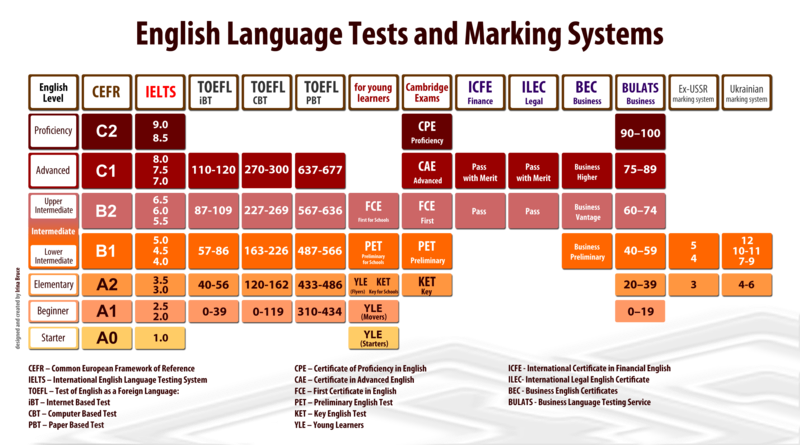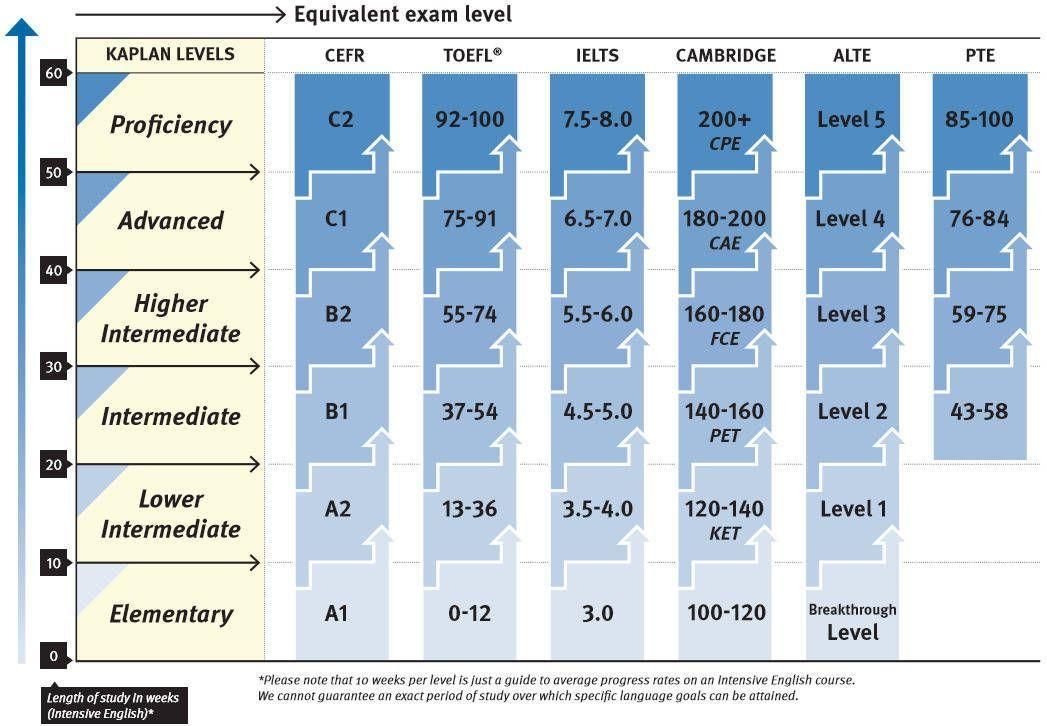
Language levels
What does it mean to know a foreign language? Everyone has their own understanding of this notion: someone is satisfied with the level that enables them to travel freely around Europe, but for someone it is not enough to read Shakespeare’s works in original. Subjective criteria vary greatly concerning this point — from knowledge of some key phrases to an intuitive feeling for language (sometimes even those who speak it as a mother tongue can lack this talent). Nevertheless, we all study language for some purpose: to move to another country, to study at a foreign university, to use English at work.
It goes without saying that it is impossible to obtain good results at language learning when you don’t have a definite aim. Therefore, no one can go without some objective criteria, i.e. those characteristics that can be used to check your command of a foreign language in practice. That’s why below you may find the English language level scale as it is the most widespread foreign language. This scale corresponds to the CEFR system developed by the Council of Europe. Moreover, a comparison between these levels and the most popular international exams (IELTS/TOEFL/Cambridge/PTE) and some advice on how to master a foreign language starting from the lowest elementary level up to the highest one are also given below.
Tests and language levels comparison

How to check your foreign language level by yourself?
Today it is possible to find out your level of a foreign language even without leaving home due to many online tests. Below you may see a selection of such several tests. It is necessary to take into account that such tests do not reflect your language level precisely because usually they are found at Internet resources connected with foreign language schools. These schools offer paid or offline resources to assess your language level precisely. So, it means that even receiving results based on the CEFR system you should remember about possible online tests inaccuracies. Moreover, some tests based on their content are absolutely unable to assess your language knowledge at advanced levels (C1-C2) objectively.
Some of the tests listed below require registration before starting, but there are many tests on the Internet that allow you to get results only after registration at a site or after contacts with a foreign language school which is usually very annoying and takes some additional time. That is why such tests are not included in the tables.

Multipurpose online English tests
Tests of this kind include questions from different language knowledge areas: listening, reading, grammar and vocabulary. Thus it is one of the most objective way to learn your English level for free. The only obvious disadvantage is that speaking cannot be tested during these online tests.
| Test | Questions | Time | Level | Choices | Ranking | Timer | Registration | Listening | Reading |
|---|---|---|---|---|---|---|---|---|---|
| EF SET Certificate | 42 | 50 min | A2–C2 | 4-5 | 9.7 | + | + | + | + |
| Kaplan International | 50 | 20 min | B1–C2 | 5 | 7.4 | - | + | + | + |
| LSI | 50 | 20 min | A2–C1 | 3–4 | 7.4 | - | + | + | + |
| Oxford Online English | 140 | 70 min | A1–C1 | 4 | 7.2 | - | - | + | + |
| Exam English | 30 | 20 min | A2–C1 | 4 | 7.0 | - | - | + | - |
| Transparent English | 50 | 20 min | A2–C1 | 4 | 6.8 | - | - | - | + |
| EF SET | 20 | 15 min | A2–C2 | 4 | 6.5 | + | - | + | - |
| ILAC | 60 | 30 min | A2–C1 | 4 | 6.5 | + | + | - | + |
Grammar and vocabulary online English tests
Knowledge of grammar is essential for any further language study. The following tests give you an opportunity to evaluate your English level without spending a lot of time. The results will not certainly be precise, but they can provide you with some basic information about your English.
| Test | Time | Questions | Level | Choices | Grammar | Verbs | Vocabulary | Ranking |
|---|---|---|---|---|---|---|---|---|
| Cambridge Institute | 35 min | 83 | A2–C2 | 6 | 9 | 8 | 7 | 8.0 |
| St. Gilles | 25 min | 40 | A1–B2 | Write in | 7 | 8 | 7 | 7.3 |
| St. George International+ | 10 мин. | 10 | B2–C1 | 4 | 8 | 6 | 6 | 6.7 |
| Englishjet | 35 min | 68 | A2–B2 | 4 | 7 | 7 | 6 | 6.7 |
| Cambridge Assesment English | 10 min | 25 | A1–B2 | 4 | 7 | 8 | 5 | 6.7 |
| Englishtag | 20 min | 50 | A1–B2 | 4 | 7 | 6 | 6 | 6.3 |
| ILS English | 20 min | 50 | A1–B2 | 4 | 7 | 6 | 6 | 6.3 |
| ESL | 20 min | 40 | A1–B2 | 4 | 7 | 6 | 6 | 6.3 |
| St. George International | 15 min | 40 | A1–B2 | 4 | 8 | 5 | 5 | 6.0 |
| British Council | 10 min | 25 | A1–B1 | 3 | 6 | 3 | 4 | 4.3 |
About tests evaluation
- Grammar — how deeply the English grammar knowledge is checked, including such topics as tense system, if-conditionals, subordinate clauses, sequence of tenses, passive voice;
- Verbs — how detailed a test checks the knowledge of English verbs (irregular, modal, phrasal verbs) is evaluated separately. This point also includes the information if there are tasks checking preposition usage with verbs, infinitive and gerund;
- Vocabulary — the evaluation of vocabulary variety used at tests and the presence of tasks demonstrating its usage;
- Listening — if a test includes this part, then such features as the level of its difficulty, speed, the usage of different voice qualities, accents and the presence of exterior noise etc are evaluated;
- Reading — evaluation of tasks for text perception and comprehension if they are included in a test. Mainly the level of texts difficulty is evaluated.
Why is it important to know your language level?
- To define your aims correctly: Only if you know your foreign language level, your may assess your opportunities properly and also set your short-term and long-term goals. It can help you to choose the curriculum correctly and find a qualified teacher;
- It is necessary to indicate your language level in your CV when applying for a job: today many companies ask applicants to indicate their foreign language level confirmed by a special certificate in their CVs. In order to get a high position in a multinational company, it is necessary to have a good command of a foreign language.
- To study abroad: it is impossible to enter a prestigious college or university without a good command of a foreign language. And what's more, members of college admissions office require an official confirmation — a foreign language certificate.

Foreign languages in practice: what is important?
The first thing you need to remember is that foreign language level can only be checked in practice. To define your real language skills by yourself is almost impossible even with the help of Internet-tests as they only define grammar knowledge and very restricted vocabulary. That is why it is better not to trust these results very much as they may differ in real life situations.
Identifying any foreign language level including English all experts pay attention to the 4 key skills: listening, reading, speaking and writing. It is these skills that are checked at various international exams. It is obvious that Internet tests can help to assess only the two first criteria, though in real life it is more important to be able to express yourself in speaking and writing.
It is difficult to assess your foreign language level by yourself not only because self-evaluation is difficult but also because the knowledge of a foreign language cannot remain constant all the time. For example, you can understand very complicated texts written in a foreign language that correspond to the advanced level, but you cannot speak fluently. It means that, on the one hand, such a person knows a foreign language at a professional level, but, on the other hand, his or her communicative skills are not developed. So, how in this case can we define our foreign language level? Professional linguists and experts define foreign language mastery according to several levels which can be applied not only to the English language but also to the majority of languages spoken all over the world.
A0 — Zero level of the English language
| IELTS | TOEFL | Cambridge | PTE |
|---|---|---|---|
| 0 | 0 | - | 0 |
To be honest, there is no such a level at all, but it is worth mentioning it as 80% of self-critical beginners think surely that they have no knowledge of the English language at all. It is necessary to highlight that if a person knows how to translate the words dog or house from English into his or her own language, it means that this person already has at least some very basic knowledge of a foreign language. It doesn't really matter what the source of this knowledge was: classes English for 2 years at school, a phrase-book that was read only once or 2 weeks of learning English with a private teacher 15 years ago — this knowledge ever received remains with you for always. It is very important because even poor basic knowledge can serve as a foundation for further studying.
If we speak about zero level of a foreign language, it means that a person doesn’t know language at all (it is true, for example, if a person speaks English as much as he or she speaks Filipino). In this case you may enroll in English classes in your own country. After 3 months of studying your level will raise up to speaking level B1. If a person knows the English alphabet more or less and understands what means "Hello! How are you?", it shows that his or her level of a foreign language is A1.
How to move to the next step: start with lessons for absolute beginners where you can learn the alphabet, rules of reading, key words for simple texts comprehension and 300 new words. It will take you about 2 weeks to do these things.
Level A1 — Beginner
| IELTS | TOEFL | Cambridge | PTE |
|---|---|---|---|
| 2 | 15 | - | <30 |
This level is also called a ‘Survival Level’. It means that if you are lost in a foreign city in England or America, you will be able to get at least to the Russian embassy by asking locals for directions. This level cannot be called spoken as it will not be possible at this stage, of course, to make a coherent dialogue. Joking apart, this level is quite enough to study at foreign language course abroad.
Even the most scant language skills enable you to deliver your message to your interlocutor at the very least even if you can’t avoid an active usage of body language. Usually this level have those people who studied English a long time ago and without pleasure. Of course, such people lack skills of real language usage, but they have some basic knowledge borne in minds that can become a good foundation in further studying.
A student has a beginner level of a foreign language if:
- can answer some basic questions about his / her name, age, homeland, job;
- can understand familiar phrases provided the other person talks slowly and clearly;
- can understand some words in English texts.
How to move to the next step: learn reading and pronunciation rules, get acquainted with English grammar rules and learn about 300 new words.

Level A2 — Elementary
| IELTS | TOEFL | Cambridge | PTE |
|---|---|---|---|
| 3.5 | 31 | KET | 30 |
If a person with a beginner level can live without knowing about it, a person with an elementary level should remember something about some language phenomena. Again, this level is far from spoken language, but in comparison with level A1 you can make a better dialogue at this stage.
If we return to the situation when you find yourself in a foreign English or American city, the situation of communication is better here: with your elementary level of a foreign language you can not only get to the embassy, but also speak with foreigners (for example, tell them about your job or order in a cafe).
There is very little difference between levels A2 and A1 in practice, but the main advantage of the former is higher self-confidence of a speaker and larger vocabulary. Nevertheless, the possibilities for communication remain limited, therefore level A2 can only be used as a foundation for further studying and cannot be applied in practice.
A student has an elementary level of a foreign language if:
- can speak on some everyday topics: can ask for or give directions, tell about him / herself and about things around;
- can understand the other person provided he / she speaks clearly on a familiar topic;
- can read and understand elementary sentences (I have..., You are..., He goes...);
- can make a simple sentence in a written form or fill in a questionnaire in English;
How to move to the next step: continue learning grammar, try to write small texts, learn the forms of irregular verbs, practice oral speech (you may do it via Skype or at speaking clubs), watch films in English with subtitles, learn about 500 new words.
Upper Elementary / Pre-Intermediate level
- It is very close to the level B1, but a student lacks practice in some spheres (e.g. in writing) which means that his / her knowledge corresponds to Pre-intermediate level;
- It coincides completely with the description of A2 level and partly with B1 (e.g. speaking is better developed) which indicates that a student knows foreign language at Upper-Intermediate level.
Level B1 — Intermediate level
| IELTS | TOEFL | Cambridge | PTE |
|---|---|---|---|
| 4 | 60 | PET | 43 |
When the foreign language competence is more than just a confusing speech about museums and restaurants situation and English texts and speech are becoming much clearer these facts indicate that a student now is at the first stage of spoken English. But apart from speaking this level includes good reading skills to deal with adapted texts as well as understanding of core English grammar. According to the statistics, it is this very level that most tourists acquire and it helps them to speak fluently with the other person on some everyday topics. Nowadays high school pupils leave school with foreign language knowledge at minimum B1 and maximum at B2 level. Nevertheless. In order to speak really fluently, you need to work hard.
A student has an intermediate level of a foreign language if:
- can support conversations on any everyday topic pronouncing words correctly, but at the same time may stumble or make some mistakes;
- can understand the other person and also catch main points of more complicated speech (such as lecture) or during conversation between native speakers (in films);
- can read adapted texts for Intermediate level with a dictionary and understand the meaning of simple texts;
- can produce some written texts, e.g. essays about him / herself or about the world around using widespread constructions and vocabulary.
How to move to the next step: become familiar with more advanced vocabulary and grammar, get better training at written English (a private tutor or sites for English self-education, e.g Polyglotclub, can be useful in this way). What is more, it is necessary to speak more with native speakers or advanced learners, follow news in English language information sources (news editions, entertainment articles, sites based on interests), watch films with English subtitles (it can seem to be quite difficult at first, but you’ll definitely see some results a bit later). It is also important to expand your vocabulary and learn no less than 1000 new words.
Level B2 — Upper-intermediate level
| IELTS | TOEFL | Cambridge | PTE |
|---|---|---|---|
| 6 | 90 | FCE | 59 |
If a student has good speaking skills (for the level more than Intermediate), can support a conversation with a foreigner, has quite good listening skills, watches English films without subtitles and translation, it means that he or she knows foreign language at level B2. It should be mentioned that such a student can be mistaken for a native speaker or foreigner by those people who don’t know English at all. Nevertheless, you need to stop deceiving yourself. Upper-intermediate is a really good achievement, but sometimes it isn’t enough for professional purposes. As for another drawback, it will be much more difficult to reach high levels after this stage in case of self-education. However, this level is quite enough to enter a foreign university with average entry requirements for their applicants, and students may surely apply for TOEFL or IELTS exams.
A student has an upper-intermediate level of a foreign language if:
- can easily speak on almost any topic, express his or her own opinion and attitude. Nevertheless, some mistakes are possible at this level, including problems with verb conjugation, usage of tense-aspect forms and complex words;
- can understand oral remarks on any everyday topic and nearly 80% of more complicated speech (lectures, films, interviews);
- can understand the meaning of informative English texts well and get information from English resources almost without loss of meaning (at the same time it is allowed to use dictionaries while reading texts on some unknown topics);
- can explain his or her viewpoint in written form, using the most widespread constructions (although some not very serious mistakes are possible here).
How to move to the next step: study more advanced English grammar, get better training at writing texts in different styles (formal, academic, professional), get used to receive the most part of the information form English sources (e.g. you can read news only in English during several weeks), study phrasal verbs, listen to lectures and watch informative films in English, expand your vocabulary by learning at least 600 new words.

Level C1 — Advanced level
| IELTS | TOEFL | Cambridge | PTE |
|---|---|---|---|
| 7.5 | 100 | CAE | 76 |
To understand the distinction between advanced and upper-intermediate level is maybe possible only for professionals or anglophones and, of course, for a student him or herself but only if he or she has so-called feeling for language: when while speaking it becomes clear the vocabulary is used adequately, but sentences can be formed a bit differently by choosing finer words and more appropriate terms. It shows that the problem of language knowledge is turned into a problem of its correct usage, so a person now speaks English as a foreign language at a high level. It is absolutely clear that here we cannot even suppose some situation of misunderstanding. A student with C1 level has excellent listening skills and can express his / her thoughts clearly in written form. The only thing that is out of his / her power yet is reading Shakespeare's works or the novel Lolita written by V. Nabokov in the original. This level is recommended when you apply for a job in an international company and it gives entrance to almost all foreign universities and colleges (including top ones — Yale University, University College London, Swiss Federal Institute of Technology).
A student has an advanced level of a foreign language if:
- can speak on any topic without problems, express shades of emotions in foreign language;
- can understand any oral speech;
- can easily read English texts of different genres (articles, newspapers, interviews as well as scientific articles in journals, textbooks, philosophical, critical works etc) and only seldom come across some unknown words;
- knows how to write an application form and covering letters and clearly understands the difference between formal and informal styles.
How to move to the next step: continue working with complicated English texts, read British and American works of literature in their original, listen to professional lectures concerning English literature, learn English idioms and figures of speech, and communicate as much as possible with native speakers.
Level C2 — Proficient
| IELTS | TOEFL | Cambridge | PTE |
|---|---|---|---|
| 8.5 | 118 | CPE | 85 |
The highest step in the grading scale of English levels is level C2. It should be mentioned that it is still a step not a final stage. Level C2 corresponds to excellent knowledge of English as a foreign language, its adequate and correct usage in any everyday or professional situation and to the ability to read with ease any work of fiction or professional text in English. Nevertheless, to know English at level C2 doesn’t mean to have perfect knowledge of this language as many people like to say.
Any linguist or scholars of language and literature can confirm that only a few people have perfect command of a foreign language and they become outstanding writers and great communicators. But if we look at the most obvious example — an educated London citizen — it also lies outside the scope of level C2 (usually those people who speak English since their childhood are called native speakers, and this is definitely outside the gradation level scale of English as a foreign language).
You should always remember that there is no limit to perfecting your language skills further, although language knowledge of level C2 is a great result that not everyone can achieve. If you have this level, you can enter any postgraduate programme, publish your works in English, deliver lectures and take part in scientific conferences. i.e. this level is enough for any professional sphere.
A student has a proficient level of a foreign language if:
- has acquired almost authentic pronunciation as native speakers have;
- knows how to translate idioms drop a dime, chew the fat and kick the bucket;
- can read the first act of Romeo and Juliet play, without referring to dictionary;
- can write meaningful text of two pages concerning the topic of unemployment in Cambodia;
How to move to the next step: spend several years in an English-speaking country, for example, studying at university or during internships. And, of course, reading books in their original language is a must do.
What should we know about learning foreign languages?
Study foreign language by yourself is quite possible, but such learning process requires from a student a lot of strength, energy and time as well as such traits of character as being diligent, hard-working and single-minded. At first these lessons seem to be interesting but as time goes by a lack of precise curriculum, correctly set aims, time limits and a teacher who controls the process and motivates a student leads to the next failure and lack of desire to continue learning foreign language.
This is why it is better to start learning a new language together with a teacher during private or group lessons. When the core material is already studied, to improve your communication skills and to expand your vocabulary you can go abroad. Without studying some time in a country where the studied language is the main one it is impossible to achieve a perfect command of it even if you use the most advanced and cutting-edge textbooks.
Contemporary language tends to change and develop every day and no study book can reflect these rapid changes. It mainly refers to slang, borrowed words, a variety of dialects etc that change the language on a regular basis. It is possible to know foreign language at the level of native speakers, but in order to achieve that you should find yourself in a necessary language and cultural environment, where a student will need to become a part of a foreign society, to keep up on news that appears in print media or on the Internet.

How much time do you need to learn a foreign language?
The answer to this question depends on several factors: the student's aims, his / her diligence and industriousness and ability to pay. It is quite logical that it is possible to learn foreign language more quickly only with the help of a qualified teacher (or maybe, even native speaker). It is a good contribution to your future that will be definitely paid off but requires quite a big investment.
The more quickly a student wants to learn a language, the more he or she needs to pay. In theory you may need about 2,5-3 years to go through all levels (without living abroad). And in order to do this you need to attend special language courses several times a week. If you choose self-education, in this case you will need more time to learn a language. Studying abroad a student receives the same amount of knowledge but during a shorter period of time.
Don't expect miracles
Beginners should clearly understand that the learning process takes much time and effort to overcome the desire to postpone a lesson or put off doing homework. Studying is hard and demanding work! That's why it is impossible to learn a language during one month with the help of a unique teacher’s method or using subliminal stimuli technique. Don’t expect miracles! Only the mistakes analysis and consecutive learning of new material can be helpful at needed level achievement.
Time needed for level advances

This table shows the number of weeks of intensive English courses for English level advances at schools Kaplan International
Want to learn a foreign language, academic terminology, and prepare for exams?
Our experts will select the optimal options and guide you through the entire process of enrolling in language courses at a university.




